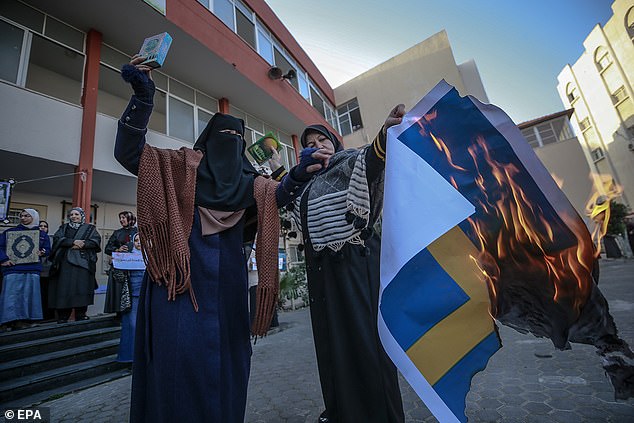Recently, Swedish officials came under fire for allowing the burning of a copy of the Quran, the Muslim holy book, in front of the Turkish embassy. Turkey quickly condemned the actions of the Swedish government and threatened to withhold North Atlantic Treaty Organization (NATO) membership from Sweden. Turkey’s threat holds significant weight as Sweden’s neighbor, Ukraine, has been embroiled in a war with Russia since February 24, 2022. Consequently, Sweden and its Scandinavian neighbor Finland have attempted to fast-track their entry into NATO due to fears of invasion. Other than Hungary, Turkey is the only country within NATO hesitant to admit Sweden. So why would Sweden compromise their chance of safety by angering Turkey? The answer is rooted in a long history of xenophobia and Islamophobia within the country.
Sweden first encountered Islam during the 16th-17th centuries as the country built its military power. As the Swedish Empire grew, so did its extreme religious policies. Although the Swedes were originally Catholic, they transformed into a Protestant country in the 16th century and, in 1665, outlawed their predecessor’s religion, among many others. Catholics and Muslims were seen as ignorant and enemies of the “true Christian religion.” However, Swedish sovereignty diminished as civil wars broke out and the empire lost territorial and financial power. Meanwhile, the Ottoman Empire rose politically, and with it, its religious influence as a Muslim state. The Swedish government eventually had to make concessions to the Ottomans to keep their power away and, as a result, allowed Muslims and Jews to practice their religion within Sweden.
Later, Sweden began to re-establish its power during the 19th century and call for “unity.” The Social Democratic Party was formed to unite Sweden and promote nationalism. At the same time, Orientalist studies emerged, in which European scholars created studies about Islam without interacting with Muslims. Edward Said, a prominent Palestinian Christian writer, describes Orientalism as “a Western style for dominating, restructuring, and having authority over the Orient.” Orientalism embodied and produced a stereotypical view of Islam and the Eastern world, depicting the religion as inferior to the Swedes’ Christianity.
After World War II, an influx of refugees across Europe forced the government to rethink its policies and introduce multicultural policies. Still, certain religions, especially Islam, were painted more negatively than the dominant framework. In 1990, Swedish professor Håkan Hvitfelt conducted the first study regarding Muslim perceptions in Sweden. The study revealed 65% of Swedish people had negative feelings toward Muslims, and only 2% had positive feelings, leaving the rest undecided. About 88% of Swedish people who disliked Islam believed practicing Islam was incompatible with democracy. Moreover, about 62% of Swedes associated the Islamic veil, hijab, with female oppression. The majority of Swedish citizens developed a generally negative attitude towards Muslims. After the September 11, 2001 attacks, misperceptions increased, as demonstrated by the increasing amounts of Islamophobic hate crimes.
Today, the Social Democrat Party is Sweden’s largest and oldest party. Most moderate or left-leaning parties modeled themselves after the Social Democrats but focused on separate issues. But in the past 20 years, right-wing politics have increased in Swedish discussions. At the forefront of this movement are the Sweden Democrats, who were founded on ultranationalist and neo-Nazi sentiment and currently hold Islamophobic and xenophobic ideals. On September 11, 2022, the Sweden Democrats finally gained most of the seats in parliament since their foundation in 1988, ultimately “marking a new far-right surge in Europe.” Swedish political scientist Johan Martinsson attributes their rise to promise to the “high number of asylum-seekers and unusually rapidly changing demographics in terms of ethnicity and the share of foreign-born citizens.” Similarly, as emerging right-wing parties continue to fight for Islamophobic and anti-immigrant policies, most left-leaning parties also adopted restrictive immigration policies.
These restrictive policies are demonstrated through one family that escaped from Syria at separate times. The family had found Sweden the most viable option to run to because they had friends or extended family there. The first half of the family escaped just when the war started and gained citizenship quickly. The other half gradually arrived in Sweden by 2017. In an interview with one of these family members, Reem Walid, explained the long process to gain citizenship. Since coming to Sweden, she has had a short-term visa that she constantly has to renew while waiting for permanent residency. To get a permanent visa, she must work full-time and earn enough money to provide for herself. Walid explains this policy was not in place when her uncle arrived in 2012. Frustrated, Walid stated, “every year they add new restrictions making it harder for us to get the permanent visa.” Once a resident obtains a permanent visa, it becomes easy to apply for citizenship. Walid is thankful for the Swedish people she has met who have understood and respected her experiences and religious beliefs.
Yet Walid expects right-wing politics to continue to blossom along with immigrant restrictions: “Swedish people are becoming tired of refugees. They are upset that refugees, especially Muslims, are not assimilating into Swedish culture.” Though Reem herself hasn’t faced explicit discrimination, she attributes it to living in a refugee community. But videos of Muslims being harassed in other parts of Sweden are common to see on her social media feed. Moreover, institutional discrimination policies are being set in place.
These policies have historically targeted brown and black communities. The recent coverage of the Russian-Ukrainian conflict has revealed the root of this bias in treating refugees. Reporters and lawmakers have repeatedly stated that Ukrainian refugees are “not refugees from Syria, these are refugees from Ukraine . . . They’re Christian, they’re white, they’re very similar.” In Europe, hate crimes towards non-Christians and racial minorities are increasing substantially towards non-Christians and racial minorities. Even in the United States, anti-immigration sentiments are being linked to nationalistic ideologies.
Around the world, Islamophobia is on the rise especially as Muslim citizens, from countries such as Syria and Iraq, continue to be subjected to war crimes and financial crises. Nationalism has become deeply tied with xenophobia as citizens refuse to help “others,” due to the fear of losing their cultural identities, livelihoods, and even safety. It is no surprise that Sweden is following suit.
These refugees have become the administration’s responsibility and deserve the same respect and due process as other citizens. In the meantime, the Swedish government should expect the same restrictive treatment when applying for NATO citizenship.
Featured Image: Daily Mail






Comments are closed.